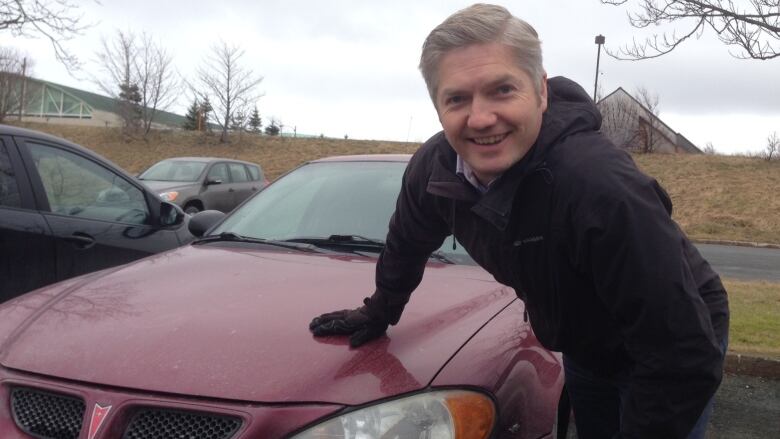Driver's delight: Tumbling gas prices comforting for commuters
Not so good for a provincial treasury addicted to oil revenue

It's just after 7:30 a.m. on Sept. 22 as I slide the seatbelt over my shoulder and lap, ready to set out on a new chapter in my career.
It's Day 1 of a new job at the CBC in St. John's.
I am 82 kilometres away from the CBC office on University Avenue, and the gas hand is pointing to "full," having topped off the night before at a cost of $1.33.5 per litre at an Ultramar station in Conception Bay North.
The temperature gauge tells me it's 18 degrees Celsius, and it's cloudy.
Perfect driving conditions.
With a careful slurp from a steaming Thermos of tea and an extralong breath, I move the gear selector into the drive position and begin the journey, travelling along Roaches Line and onto the Trans-Canada Highway.
I join hundreds of others on the daily motoringmigration to St. John's and environs.
About 45 minutes later, I take the access ramp onto Thorburn Road in St. John's, and face my first morning traffic snarl. It takes another 20 minutes to navigate the relatively short distance to my new place of work.
After a day-long whirlwind of introductions and orientation, including a surprise appearance on the St. John's Morning Show with host Anthony Germain and web guru John Gushue, Day 1 is in the books.
A pinch on the pocketbook
I make the return journey to Conception Bay North and pull into the service station once again, eager to find out what I'll be paying each day to commute back-and-forth to the city.
I pump 16.11 litres of regular unleaded into the fuel tank before the automatic shut-off engages.
Total sale? $21.50.
Ouch!
My brain is instantly doing the math.
That's more than four hundred bucks per month!
The last time I commuted to work in the city July 2010 the price-per-litre was $1.10. Those were the days.
Searching for some positive spin, I tell myself it could be worse. In early July, the maximum price for a litre of gas had been$1.40.
It's also the price you pay, I remind myself, for the privilege of living "around the bay" and working in the city.
A downward trend
I quickly settle into a commuting convention, with a keen eye on the road and another on the fuel gauge, and an ear to the radio.
The kilometres on the 11-year-old Pontiac that carries me back and forth each day rapidly inflate, and should hit the 300,000-mark by mid-winter, if it holds together (fingers crossed).
But just three months after beginning this new adventure at the Canadian Broadcasting Corporation, a lot has changed.
A slump in the price of oil that began mid-year turned into a free-fall late in the year.
On Sept. 22, a barrel of Brent crude was selling for US $95.37.
On Dec. 22, that same barrel was fetching just over $60.
The plummeting prices are a major worry in this province, where one-third of revenues come from activity in the oil and gas sector, and the deficit for this fiscal year is now expected to top $900-million.
Relief is bittersweet
For commuters like me, it's a bittersweet feeling every time I pull up to a gas pump.
The maximum price for gasoline has dropped by more than 30 cents since Sept. 22, and that's welcome news. At some locations, including Costco, gas is selling for just over90cents.
On average, I'm spending about $5 less per day on fuel.
That's whatyou call relief at the pumps.
On the other hand,how is the provincial treasury is going to cope with such an enormous loss in revenue? Job cuts? Higher taxes?
Will we ever see a return to balanced budgets?
With analysts predicting the slump in oil prices to continue into 2015 and beyond, I'm left wondering what will break down first:my battered Pontiac or the Newfoundland and Labrador economy.












_(720p).jpg)


 OFFICIAL HD MUSIC VIDEO.jpg)
.jpg)



























































































